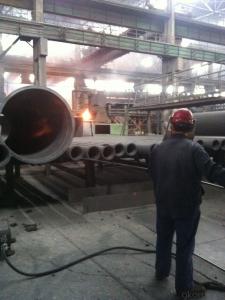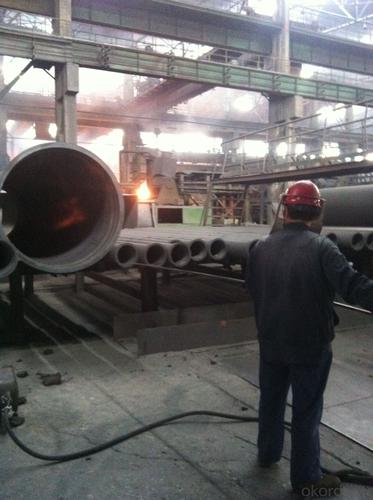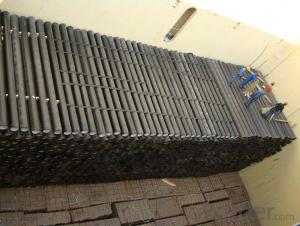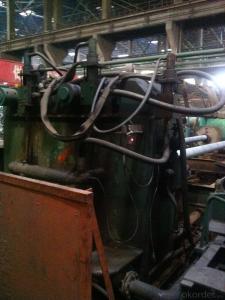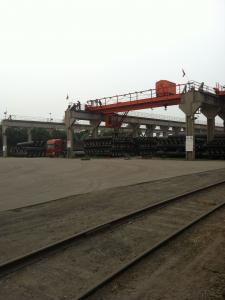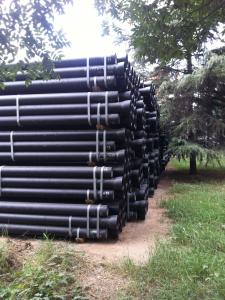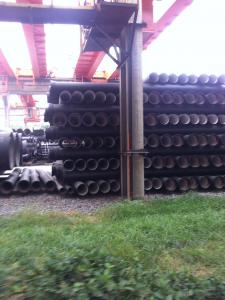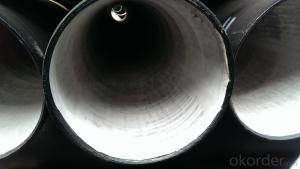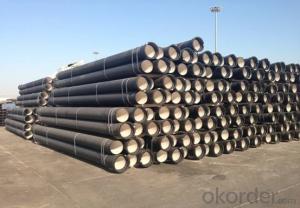DUCTILE IRON PIPES AND PIPE FITTINGS K9 CLASS DN1000
- Loading Port:
- Tianjin
- Payment Terms:
- TT OR LC
- Min Order Qty:
- 22 pc
- Supply Capability:
- 3000 pc/month
OKorder Service Pledge
OKorder Financial Service
You Might Also Like
Material : Ductile Cast Iron
Size Range : DN 80mm to DN 2000mm
Unit Effective Length : 6m or 5.7m
Manufacture Standard: ISO 2531:1998/ EN 545:2006/EN 598:2007
Annual capacity : 200,000 tons
Coating Exterior: Zinc 130g/m2 according to ISO 8179-1 and bitumen coating 70 microns.
Cement Interior: Portland Cement/ High Alumina Cement/ Sulphate Resisting Cement Lining according to ISO 4179
Special requirements on external coating and internal lining can be applied
We also provide accessories such as SBR/EPDM rubber gaskets, lubricant paste, pipe caps, PE sleeves, etc.
Additional Parts:
Each pipe is strictly inspected according to related standard to ensure permanently high performance.
Easy Installation at site and service free for life
Long Service Lifespan
Quotation will arrive you within 24hours once we get your inquiry.
We guarantee offering you a competitive price.
A copy of original inspection reports of pipes will be offered after shipment.
Photos of loading process will be sent to the customer after shipment effect.
We will follow-up the delivery progress after shipment effect and update to the customer on weekly basis.
- Q: How do ductile iron pipes perform in acidic soil conditions?
- Ductile iron pipes perform well in acidic soil conditions due to their inherent corrosion resistance. The high carbon content and protective coating of ductile iron pipes make them less susceptible to corrosion from acidic substances in the soil, ensuring their durability and longevity.
- Q: What is cast iron pipe?
- According to its manufacturing methods can be divided into: sand, centrifugal pipe, straight pipe, continuous cast iron pipe and sand pipe.According to the material used, it can be divided into gray iron pipe, nodular cast iron pipe and high silicon iron pipe.
- Q: Ductile iron pipe joint damage, water leakage, want to see the connection with other pipe fittings, how to operate?!
- The ductile iron pipe can be used as the plugging device for the big part
- Q: Is it better to use steel tubes or ductile iron pipes for water supply?
- You need a definite environment to say which kind of pipe is good!1, ductile iron pipe is cheap, corrosion resistance, lack of toughness is poor, not easy to process;
- Q: What is the lifespan of ductile iron pipe?
- The lifespan of ductile iron pipe can vary depending on various factors such as the quality of the pipe, the environment in which it is installed, and the maintenance practices followed. However, on average, ductile iron pipe has a lifespan of around 80 to 100 years. This long lifespan can be attributed to the inherent durability and strength of ductile iron, which allows it to withstand high pressure, external loads, and environmental conditions. Additionally, ductile iron pipe is often coated with protective linings such as cement mortar or epoxy to further enhance its resistance to corrosion and extend its lifespan. Regular inspections and maintenance can also contribute to prolonging the lifespan of ductile iron pipe by identifying and addressing any potential issues in a timely manner. Ultimately, with proper installation, maintenance, and care, ductile iron pipe can provide reliable and long-lasting service for several decades.
- Q: Are ductile iron pipes suitable for trenchless pipe ramming installations?
- Ductile iron pipes are indeed appropriate for trenchless pipe ramming installations. This material possesses remarkable strength and durability, enabling it to withstand the impact and stress encountered during the ramming process. Its exceptional tensile strength allows it to resist cracking or breaking when subjected to pressure. Moreover, ductile iron pipes are highly resistant to corrosion, rendering them ideal for underground installations. Furthermore, their smooth interior surface promotes fluid or gas flow. All in all, ductile iron pipes present a dependable and economical choice for trenchless pipe ramming installations.
- Q: Are ductile iron pipes resistant to hydrogen sulfide corrosion?
- Yes, ductile iron pipes are resistant to hydrogen sulfide corrosion due to their high resistance to chemical corrosion and their protective inner lining that prevents contact between the pipe material and the corrosive elements.
- Q: Are there any special considerations for installing ductile iron pipe in rocky soils?
- Installing ductile iron pipe in rocky soils presents various special considerations. First and foremost, the excavation process can be a challenge due to the presence of rocks. Trenching becomes more difficult and time-consuming, requiring specialized equipment to break through the rocks and create a suitable trench for the pipe installation. Furthermore, the rocky soil can cause abrasion and damage to the outer surface of the ductile iron pipe during installation. This poses a potential risk to the integrity of the pipe, leading to leaks or breakages in the future. To mitigate this risk, it is advisable to utilize protective measures such as rock shields or padding around the pipe, minimizing direct contact with the rocks. In addition, the presence of rocks can impact the backfilling process. Proper backfilling is essential to provide support and stability to the installed pipe. However, rocks can hinder the proper compaction of the backfill material, resulting in uneven support and potential movement of the pipe. Therefore, it is crucial to carefully select and place the backfill material, ensuring it is free from larger rocks and adequately compacted to provide sufficient support. Moreover, the rocky soil can also affect the installation of fittings and joints. The hardness of the rocks can make it challenging to align and connect the pipe with fittings or create secure joints. Therefore, extra care must be taken during the installation process to ensure proper alignment and secure connections, preventing leaks and ensuring the long-term functionality of the ductile iron pipe system. In conclusion, installing ductile iron pipe in rocky soils demands special attention to overcome challenges related to excavation, abrasion, backfilling, and fitting installation. By taking these factors into account and implementing appropriate measures, the installation process can be carried out successfully, allowing the pipe system to operate effectively even in rocky soil conditions.
- Q: What are the different types of thrust restraints for ductile iron pipe?
- There are several types of thrust restraints used for ductile iron pipe, including thrust blocks, tie rods, and anchor blocks. Thust blocks are concrete structures placed on either side of a bend or fitting to counteract the forces created by water pressure. Tie rods are steel rods that are anchored to the pipe and secured to an external structure, providing additional support against thrust. Anchor blocks are also made of concrete and are installed at regular intervals along the pipeline to prevent movement and absorb thrust forces.
- Q: Can ductile iron pipes be used for gravity sewer systems?
- Yes, ductile iron pipes can be used for gravity sewer systems. Ductile iron pipes are known for their durability, strength, and resistance to corrosion, making them suitable for various applications including sewer systems. These pipes have excellent tensile strength and can withstand high pressure and heavy loads, making them ideal for gravity sewer systems where wastewater flows by gravity rather than being pumped. Additionally, ductile iron pipes have a long lifespan and require minimal maintenance, making them a cost-effective choice for sewer infrastructure.
Send your message to us
DUCTILE IRON PIPES AND PIPE FITTINGS K9 CLASS DN1000
- Loading Port:
- Tianjin
- Payment Terms:
- TT OR LC
- Min Order Qty:
- 22 pc
- Supply Capability:
- 3000 pc/month
OKorder Service Pledge
OKorder Financial Service
Similar products
Hot products
Hot Searches
Related keywords
